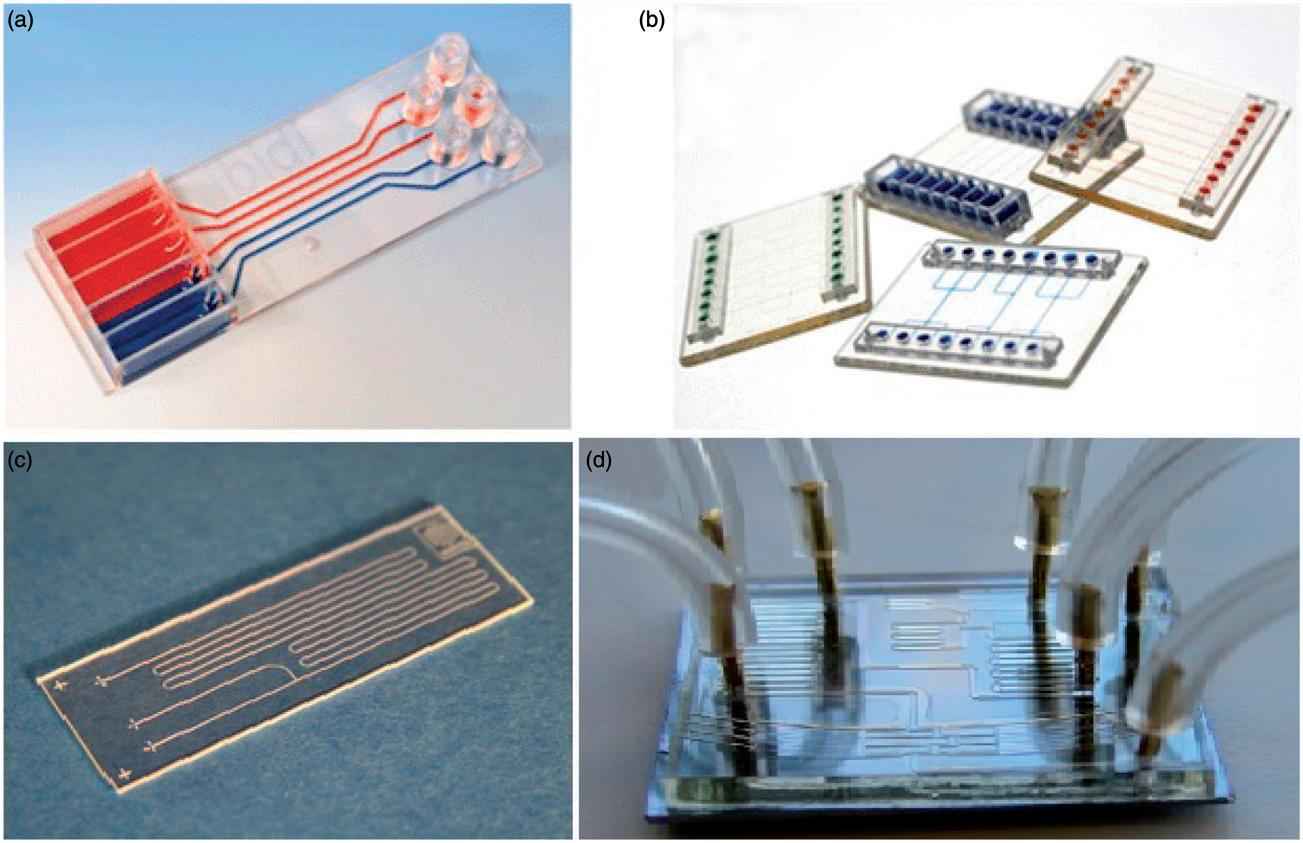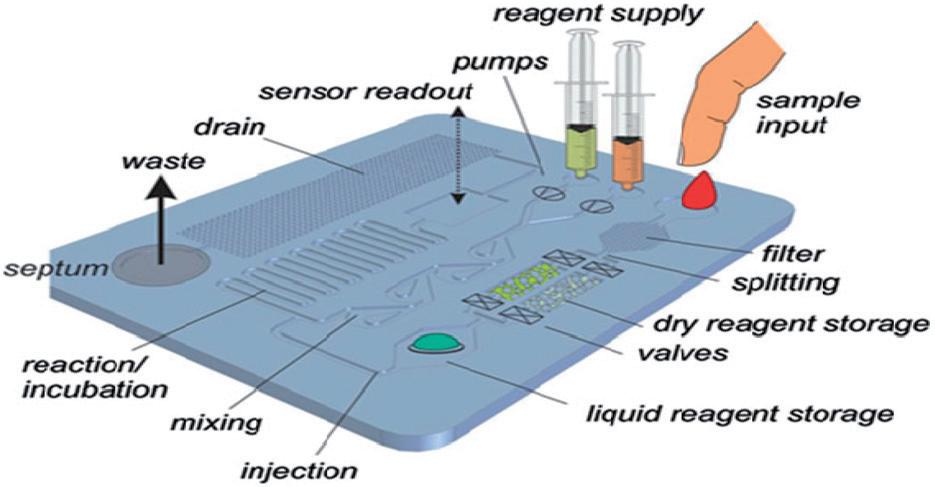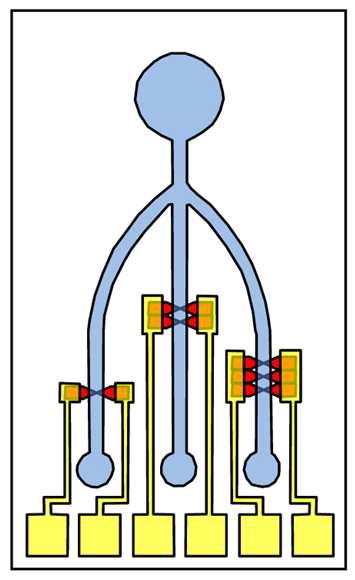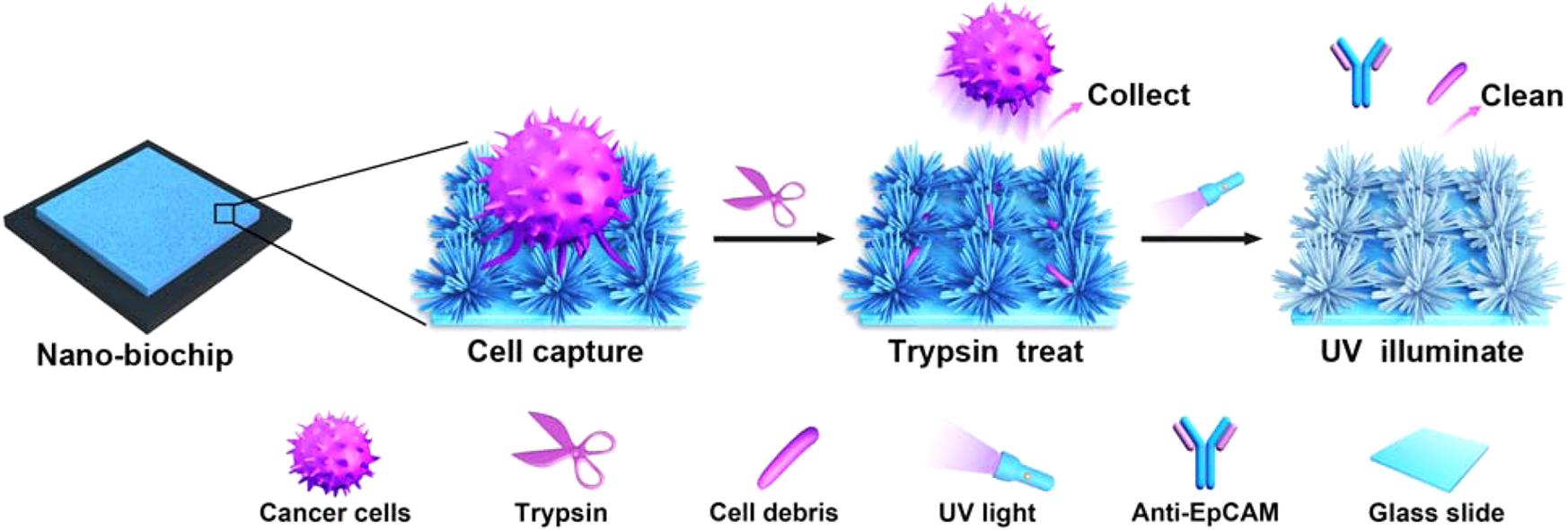Nanochip Technology for Nanoformulations
Inquiry
Nanochips, often referred to as "lab-on-a-chip" systems, are advanced devices consisting of networks of pores and channels etched onto polymer or silicon substrates. By integrating a nanostructured biofunctionalized surface, these chips are designed to detect target analytes in biological serum. CD Formulation specializes in designing and developing customized nanochip technology for gene therapy, tissue repair, and body function monitoring, providing tailored solutions to meet diverse customer requirements.
What Are Nanochips?
Protein or gene nanochips made using nanomaterials can be integrated into convenient nanofluidic devices ("labs on a chip") to better diagnose disease. Nanofluidic arrays and protein nanobiochips are examples of devices that combine nanotechnology-based biochips and microarrays, which are designed to interact with cellular components with greater specificity. Nanofluidic devices are used to separate and analyze single biomolecules, such as DNA, which provides powerful technical support for new cancer detection schemes.
 Fig.1 Image of commercially available lab-on-chip. (Fatemeh Gorjikhah, et al. 2016)
Fig.1 Image of commercially available lab-on-chip. (Fatemeh Gorjikhah, et al. 2016)
Components of "Lab-on-a-chip" Systems
"Lab-on-a-chip" systems consist of components that provide a physical means of guiding liquids, known as microfluidic channel networks. Lab-on-a-chips consist of many parts, such as sample inputs, reagent supplies, pumps, sensor readouts, drainage, waste outputs, membranes, mixing channels, and liquid reagent storage.
 Fig.2 Lab-on-a-chip devices for point of care applications. (Fatemeh Gorjikhah, et al. 2016)
Fig.2 Lab-on-a-chip devices for point of care applications. (Fatemeh Gorjikhah, et al. 2016)
Applications for Nanochip Technology
Nanochips can enhance the design and functionality of medical devices, improving their biocompatibility. CD Formulation's innovative nanochip technology holds potential in a variety of fields, including:
- Gene Therapy: Nanochips operate on the hybridization principle, where nucleic acid molecules attached to solid surfaces help diagnose and treat diseases. Their compact design and high precision make nanochips essential for medical diagnoses and gene therapy applications, including DNA research.
- Tissue Repair: Nanochip technology is capable of transforming skin cells into other cell types, such as nerve or muscle cells. This property makes nanochips highly valuable in treating chronic and acute tissue damage, offering potential treatments for various tissue types.
- Body Function Monitoring & Disease Diagnosis: The small size and intricate structure of nanochips make them ideal for implantation. Nanochips can be used to monitor bodily functions, such as heart disease or diabetes, by tracking vital parameters and providing critical insights into a patient's condition.
Our Fabrication Techniques of Nanotechnology-based Biochips
Lab-on-a-chip devices, called nanofluidic microarrays, consist primarily of heater sensors for temperature, electrophoresis chambers, fluorescence detectors, and microfabricated fluidic channels that are used to analyze and measure biomolecules (such as DNA) in solutions containing biomolecules, mix the solutions, digest the DNA, form discrete products, and then separate (isolate) and detect the products.
 Fig.3 A lab-on-a-chip microfluidic device showing the inlet and outlets. (Tenderwealth Clement Jackson, et al. 2017)
Fig.3 A lab-on-a-chip microfluidic device showing the inlet and outlets. (Tenderwealth Clement Jackson, et al. 2017)
Protein Nanobiochips
Protein nanochips capture proteins configured on thin silica nanoparticles that can be arranged in layers and are based on protein-bound silica nanoparticles. The robot immobilizes protein antibodies and enzymes in an array on a glass slide. We probe the surface of the slide with the sample of interest, which binds to the relevant antibodies on the protein chip and is then analyzed by the relevant detection method. The proteins analyzed on the array will be used to distinguish normal cell proteins from early cancer cell proteins or metastatic malignant tumor proteins.
Nanobiosensors
Nanobiosensors mainly consist of biological components (for sampling) and physical components (sensors for processing the sampling results). The nanobiosensors we developed use indicators that are able to differentiate between cells and identify certain cells, such as cancer cells, that release or produce special biomolecules to monitor the growth and development rate of these parts of the body and provide information to these cells. Site-specific delivery of drugs.
Nano-chip Biosensors
We developed a nano-chip biosensor based on the principle of detecting biomarkers of various diseases. It is portable and easy to use and has great application potential in monitoring blood glucose.
Organ-on-a-chip
An organ-on-a-chip is a multi-channel 3D microfluidic cell culture integrated circuit that can simulate the activities, mechanics, and physiological responses of entire organs or organ systems (including brain, lungs, heart, kidneys, liver, prostate, blood vessels, skin, bones, cartilage, etc.) through microfluidic devices. They have potential as alternatives to animal models for drug development and toxin testing.
Why Choose CD Formulation?
- Extensive Expertise: CD Formulation has vast experience in researching and developing nanochip technologies for nanoformulations, including protein nanobiochips, nanobiosensors, nanochip biosensors, organ-on-a-chip systems, and gene nanochips.
- Customization Services: We can provide customers with our professional nanochip fabrication services based on nanotechnology.
- Innovative Fabrication Methods: Our technical team is committed to enhancing nanochip fabrication methods and nanodiagnostics technologies to promote the clinical application of advanced nanoformulations.
Published Data
Technology: A Self-Cleaning TiO2 Nanosisal-like Coating Toward Disposing Nanobiochips of Cancer Detection
Journal: ACS Nano
IF: 15.8
Published: 2015
Results:
The authors proposed a TiO2-like nanosisal coating for treating nanobiochip waste through the photoresponsive self-cleaning function of cancer bio-nanochips. The authors pointed out that it can be achieved by combining a unique nanostructured coating (such as a nanosisal-like coating) with specific recognition molecules. This study will provide a promising strategy for the design and management of practical nanobiodevices, which can be widely used to diagnose some high-morbidity diseases.
 Fig.4 Schematic illustration of disposing nano-biochips of cancer detection. (Junyi Chen, et al. 2020)
Fig.4 Schematic illustration of disposing nano-biochips of cancer detection. (Junyi Chen, et al. 2020)
Nanochips are very small and can be detected by special sensors, which can be tracked on the human body. Nanochip technology has been successfully used for gene therapy, repairing damaged tissue, and monitoring body functions. CD Formulation is at the forefront of nanochip technology, applying its expertise to gene therapy, tissue repair, and disease diagnosis. If you're interested in our nanochip technology for nanoformulations, feel free to contact us for more information.
References
- Fatemeh Gorjikhah, Soodabeh Davarana, Roya Salehi, et al. Improving "lab-on-a-chip" techniques using biomedical nanotechnology: a review. Artificial Cells, Nanomedicine, and Biotechnology. 2016,44(7):1609-1614.
- Tenderwealth Clement Jackson, Bernard Opatimidi Patani, et al. Nanotechnology in Diagnosis: A Review. Advances in Nanoparticles. 2017,6,93-102.
- Jingxin Meng, Pengchao Zhang, Feilong Zhang, et al. A Self-Cleaning TiO2 Nanosisal-like Coating toward Disposing Nanobiochips of Cancer Detection. ACS Nano. 2015,9(9):9284-9291.
How It Works
STEP 2
We'll email you to provide your quote and confirm order details if applicable.
STEP 3
Execute the project with real-time communication, and deliver the final report promptly.
Related Services

 Fig.1 Image of commercially available lab-on-chip. (Fatemeh Gorjikhah, et al. 2016)
Fig.1 Image of commercially available lab-on-chip. (Fatemeh Gorjikhah, et al. 2016) Fig.2 Lab-on-a-chip devices for point of care applications. (Fatemeh Gorjikhah, et al. 2016)
Fig.2 Lab-on-a-chip devices for point of care applications. (Fatemeh Gorjikhah, et al. 2016) Fig.3 A lab-on-a-chip microfluidic device showing the inlet and outlets. (Tenderwealth Clement Jackson, et al. 2017)
Fig.3 A lab-on-a-chip microfluidic device showing the inlet and outlets. (Tenderwealth Clement Jackson, et al. 2017) Fig.4 Schematic illustration of disposing nano-biochips of cancer detection. (Junyi Chen, et al. 2020)
Fig.4 Schematic illustration of disposing nano-biochips of cancer detection. (Junyi Chen, et al. 2020)
